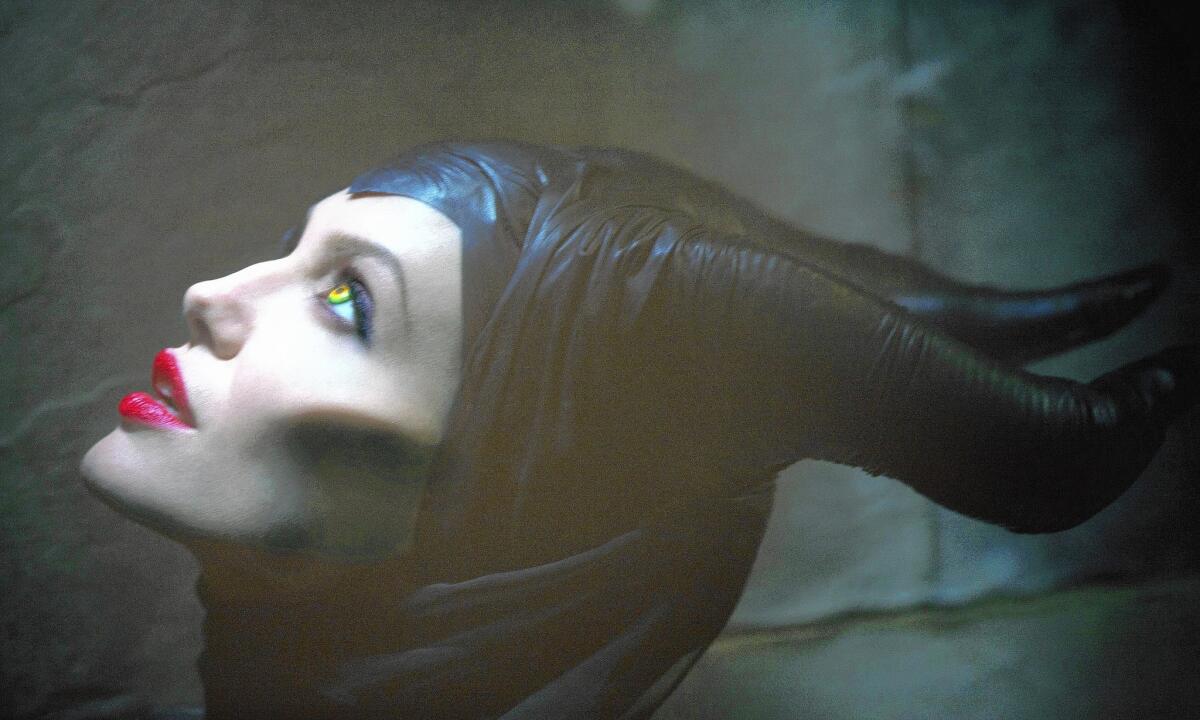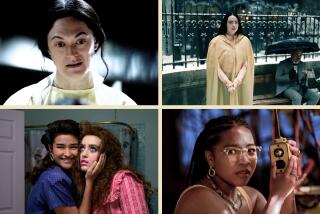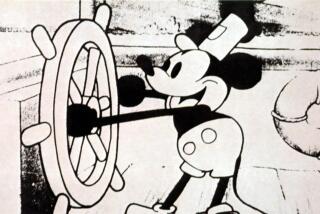Op-Ed: Disney’s ‘Maleficent’: Romancing the devil

Disney has long had a complicated relationship with Satan, paganism and heavy metal. The latest evidence: the studio’s new film “Maleficent.”
In 1940, Disney conjured the animated masterpiece “Fantasia,” in which Mickey Mouse flirted with the dark arts as the Sorcerer’s Apprentice; a dinosaur segment was set to Stravinsky’s pagan death dance “The Rite of Spring;” and the Slavic black god Chernobog, today beloved by European black-metal performers, made a dramatic appearance on Bald Mountain. In 1959, in the original “Sleeping Beauty,” the fairy Maleficent invoked “all the powers of hell” before transforming herself into a dragon. In 1996, Disney’s Hollywood Records released an album by metal 666er Glenn Danzig (though the label then abruptly fired him).
And now, risking the wrath of monochrome Christians everywhere, Disney has brought forth the box-office smash “Maleficent,” a film that turns its mythic predecessor “Sleeping Beauty” on its golden head.
Once a force of pure evil, the demonic Maleficent (played by Angelina Jolie) has morphed into a sympathetic Earth goddess akin to Demeter, cursing yet protecting her Persephone-like surrogate daughter, the sleeping beauty Aurora.
In endowing the horned Maleficent with motherly love, veteran Disney writer Linda Woolverton takes a stance similar to that of Scandinavian/European black-metal bands such as Immortal, Dimmu Borgir and Behemoth: They embrace darkness in order to align themselves against those who claim to represent the “Light” — the legions who invoked Christ while destroying primeval cultures and slaughtering the metal folk’s tribal forebears. Maleficent’s brutish screen opponents, crowned with medieval helmets, lack only crosses on their chests to identify them directly as Crusaders.
Predictably, some Christians are taking umbrage. A review of “Maleficent” in Christianity Today faulted the film for rejecting the notion of original sin in favor of the idea that “evil must have a psychological, sociological or biological cause.”
When conservatives talk about the war on Christmas and Christianity, in one sense they’re right: Jesus has lost some reputational ground. But the bad PR isn’t because media Jews want to slaughter the Lamb; it’s because Christianity has grown guilty by association with tea party extremists, Koran-burning ministers and child-molesting priests.
The rebranding of Maleficent is perhaps another sign that Americans have grown uncomfortable with their traditional role as idealistic world-savers; after Vietnam, Chile, El Salvador, Iraq and Afghanistan, only the willfully ignorant can ignore the gore on our swords. It’s easier to identify with a Maleficent than a messiah.
Our culture reflects this self-disgust in thousands of ways. The bumbling but well-meaning 1960s comedic icons of “Gilligan’s Island” and “The Dick Van Dyke Show” have been universally replaced (even on the Disney Channel) by self-interested schemers prototyped in the 1980s on “Married … With Children” and “Seinfeld.” The crime-fighting Batman of comic books became first an ironic ‘60s TV spoof and then, in film, an ever darker and more psychotic figure who creates as many problems as he solves.
Millennial America’s current role models are bloodsucking vampires and flesh-gnawing zombies — often sympathetically portrayed because, hey, we prefer to think of ourselves as messy eaters rather than exploiters.
So we deserve “Maleficent” — our vengeful, fallen yet heroic anti-Christian, as beautiful and complex a villain as we might hope to be.
The makers of “Maleficent” have said they couldn’t have made the film without Jolie, and truly, few actresses can match her combination of humanitarian credentials and triumph over personal loss; she’s an easy demon to root for. When her character’s two wings are amputated, the meanings multiply in a woman who in real life has been forced to make bodily sacrifices. And after Maleficent notices her bloodied chest after a battle, Jolie looks at us with one of the most delicate, subtle, mortal expressions cinema has ever seen.
If we can’t unconditionally love our darkened, compromised selves, she makes us at least like her.
Greg Burk is a Los Angeles writer.
More to Read
A cure for the common opinion
Get thought-provoking perspectives with our weekly newsletter.
You may occasionally receive promotional content from the Los Angeles Times.






